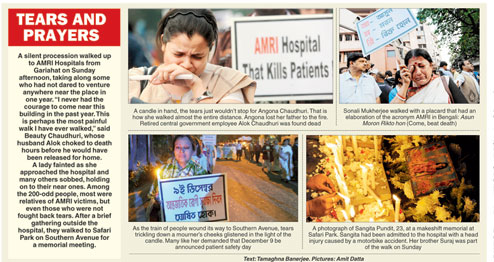 |
The wailing ambulance sirens that the neighbourhood had learnt to live with have long fallen silent. The lobby that used to teem with people round-the-clock has been deserted for months. The doctors and nurses who used to pace its corridors no longer come to work.
Time appears to have stood still at AMRI Dhakuria since December 9, 2011, but the silence all around cloaks the stirrings of a rebirth.
On the first anniversary of the fire that took 91 lives — most of them patients — in Annexe I of the hospital, Metro highlights the changes that have taken place within the organisation, in the attitude of those directly or indirectly blamed for the incident and in the lives of the families touched by the tragedy.
The hospital
The health department has decided to allow AMRI Dhakuria to reopen three of its facilities, including the main unit whose licence the government had revoked on December 27 last year, if the reconstituted management meets the stipulated safety norms.
“The AMRI group has applied for permission to reopen the main unit along with Annexe II. Both had separate licences and we are reviewing the applications. We will allow them to reopen once they receive the requisite NOCs from the fire services department, the civic body and others,” minister of state for health Chandrima Bhattacharya said.
The health department has already renewed AMRI’s licence for the diabetic clinic and pathology laboratory on the opposite flank of the main building. The fire services department recently conducted an inspection of the facility and found its fire preparedness satisfactory, sources said.
“We are planning to issue the NOC in a few weeks,” a senior official said.
Annexe I, where the tragedy occurred, won’t be allowed to open anytime soon, according to minister Bhattacharya.
The building is structurally not connected to the main unit or Annexe II, though they share the compound.
The two buildings that the AMRI management wants to reopen — the main unit and Annexe II— have undergone extensive renovation. Doors made of fireproof material have been used and the entire electrical wiring replaced.
The number of beds in the main building has been reduced from 180 to 150 to create more space. Some departments, including cardiology, will be shifted to the main building. The management has already approached CESC to restore power supply.
The management
AMRI Dhakuria has reconstituted its board of directors to give the hospital a new face. Ravi Todi and Manish Goenka, sons of co-promoters S.K. Todi and R.S. Goenka, are the only names from the old board in the new-look management.
None of the five new directors — P. Saxena, a chartered accountant, P. Jhunjhunwala, a representative of a firm of solicitors, businessman Sanjiv Agarwal and two senior AMRI officials, Rajesh Parekh and Anil Malawat — has a financial stake in the organisation. Of the 14 erstwhile directors, 10 spent various periods in jail after the fire and resigned from the board a few months ago.
S.K. Todi's Shrachi Group has a little over 32 per cent share in AMRI, while the R.S. Goenka and R.S. Agarwal families, which jointly own the Emami Group, have a 66 per cent stake. The state government’s stake has been reduced to 1.9 per cent.
The government has yet to nominate an official to the new board.
The case
All 16 people named in the chargesheet are out on bail and the trial is unlikely to start before at least next July because of various delays, including recording the statements of witnesses.
Sources said the Alipore sub-divisional judicial magistrate wouldn’t be able to start the trial until the statements of all 459 witnesses had been recorded.
“The statements of 95 witnesses haven’t been recorded yet. There is also the paper book (a compilation of the FIRs, lists of seized articles, investigation reports and statements of witnesses), which could take months to ready. The defendants too need to submit their views in writing to the court, which is likely to take another month. So we are looking at July at the earliest,” a government pleader said.
The babus
The two fire department officers who had signed the no-objection certificates that allowed AMRI Dhakuria to function without proper fire-safety arrangements were rewarded within a year of the hospital tragedy.
Debapriya Biswas was reappointed officer on special duty after he retired as additional director-general last month. His deputy Gopal Bhattacharjee was elevated to the post of ADG.
The duo haven’t been exonerated yet but their professional progress has raised questions about the government’s promise to “spare none” responsible for the AMRI fire tragedy.
The families
The families of the victims have received compensation but many aren’t sure they will receive justice.
“Compensation cannot heal our wounds. The legal process should have gained momentum by now,” said Raja Ganguly, whose 67-year-old father died in the fire.
“It’s annoying to learn that the fire department officials responsible for the NOCs have not been named in the chargesheet. How could they play with so many lives?” demanded the husband of one of the victims. “If only they had put up a notice saying that the building had a provisional fire-safety licence, we would have gone elsewhere.”
The saving grace
The fire department has discontinued the practice of issuing provisional NOCs, replacing it with a set of recommendations instead. “Once the applicants implement the recommendations, they inform us. If we are satisfied with the work done, we issue the fire NOC,” a senior official said.










